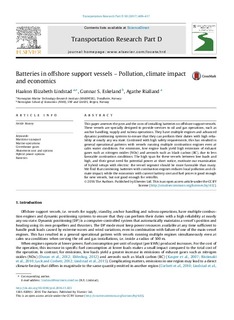Batteries in offshore support vessels – Pollution, climate impact and economics
Journal article, Peer reviewed

Permanent lenke
http://hdl.handle.net/11250/2425045Utgivelsesdato
2016Metadata
Vis full innførselSamlinger
- Articles (FOR) [100]
- Publikasjoner fra CRIStin (NHH) [249]
Originalversjon
Transportation Research Part D: Transport and Environment. 2016, 50 409-417. 10.1016/j.trd.2016.11.023Sammendrag
This paper assesses the pros and the cons of installing batteries on offshore support vessels. These vessels are specially designed to provide services to oil and gas operations, such as anchor handling, supply and subsea operations. They have multiple engines and advanced dynamic positioning systems to ensure that they can perform their duties with high reliability at nearly any sea state. Combined with high safety requirements, this has resulted in general operational patterns with vessels running multiple combustion engines even at calm water conditions. For emissions, low engine loads yield high emissions of exhaust gases such as nitrogen oxides (NOx) and aerosols such as black carbon (BC), due to less favorable combustion conditions. The high span for these vessels between low loads and high, and their great need for potential power at short notice, motivate our examination of hybrid setups with electric: the vessel segment should be more favorable than many. We find that combining batteries with combustion engines reduces local pollution and climate impact, while the economics with current battery cost and fuel prices is good enough for new vessels, but not good enough for retrofits.